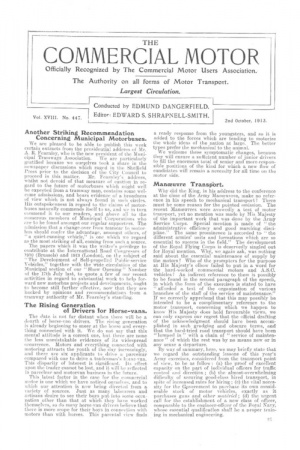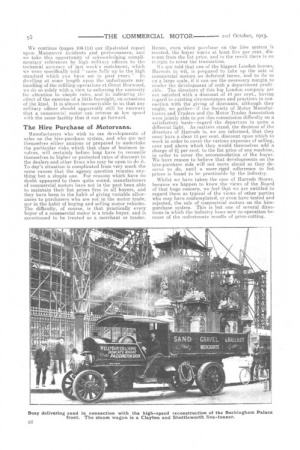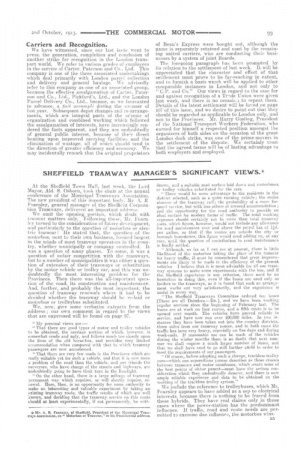COMMERCI E AL MOTOR
Page 1

Page 2

Page 3

If you've noticed an error in this article please click here to report it so we can fix it.
Officially Recognized by The Commercial Motor Users Association.
The Authority on all forms of Motor Transport. Largest Circulation.
Another Striking Recommendation Concerning Municipal Motorbuses.
We are pleased to be able to publish this week certain extracts from the presidential address of Mr. A. R. Fearnley, who is the new president of the Mimicipal Tramways Association. We are particularly gratified because we our§elves took a share in the newspaper discussions which raged in the Sheffield Press prior to the decision of the City Council to proceed in this matter. Mr. Fearnley's address, whilst not devoid of that measure cif caution in regard to the future of motorbuses which might well be expected from a tramway man, contains some welcome admissions, and bears evidence of a, broadness of view which is not always found in such circles. His outspokenness in regard to the claims of motorbuses naturally commends itself to us, and we in turn commend it to our readers, and above all to the numerous members of Municipal Corporations who are to be found amongst our regular supporters. The admission that a change-over from tramcar to motorbus should confer the advantage, amongst others, of "a quiet-running vehicle," is one which we regard as the most striking of all, coming from such a source. The papers which it was the writer's privilege to contribute at the International Road Congresses of 1.910 (Brussels) and 1913 (London), on the subject of "The Development of Self-propelled Public-service Vehicles," together with the Vide -circulation of the Municipal section of our "Show Opening" Number of the 17th July last, to quote a few of our recent activities in regard to substantial work to help forward new motorbus projects and developments, ought to become still further effective, now that they are backed by opinions and recommendations from a tramway authority of Mr. Fearnley's standing.
The Rising Generation of Drivers for Horse-vans.
The date is not far distant when there will be a dearth of horse-van drivers. The rising generation is already beginning to sneer at the horse and everything connected with it, We do not say that this mental attitude is a correct one, but there are none the less unmistakable evidences of its widespread occurrence. Motors and everything oonnected with motoring attracts the youth of the day increasingly, and there are six applicants to drive a parcelear compared with one to drive a tradesman's horse-van. This disparity of interest is significant. Its effect upon the trader cannot be lost, and it will be reflected in narcelear and motorvan business in the future.
This latest factor in the ease for the commercial motor is one which we have noticed ourselves, and to which our attention is now being directed from a variety of sources. Just as many labourers and artisans desire to see their boys put into some occupation other than that. at which they have worked themselves, so do many horse-van drivers believe, that there is more scope for their boys in. connection with motors than with horses. This parental view finds a ready response from the youngsters, and so it is added to the forces which are tending to motorize the whole ideas of the nation at large. The better types prefer the mechanical to the animal.
We welcome these symptomatic changes, because they will ensure a sufficient number of junior drivers to fill the enormous total of senior and more-responsible positions of the kind for which a new flow of candidates will remain a neceasity for all time on the motor side.
Manceuvre TransPbrt.
Why did the King, in his address to the conference at the close of the Army Manteuvres, make no reference in his speech to mechanical transport? There must be some reason for the pointed omission. The recent Manceuvres were avowedly a test of motor transport, yet no mention was made by His Majesty of the important work that was done by the Army Service Corps. Special mention is made of " the administrative efficiency and good marching discipline." The same prominence is accorded to "the different armies' units and formations which are so essential to success in the field." The development of the Royal Flying Corps is deservedly singled out for Royal mention. Why, we again ask, was nothing said about the essential maintenance of supply by the motors? Who of the prompters for the purpose at His Majesty's elbow failed to put in a word for the hard-worked commercial motors and A.S.O. vehicles ? An indirect reference to them is possibly to be found in the second paragraph of the speech, in which the form of the exercises is stated to have "afforded a test of the organization of various branches of the staff of the service of maintenance." If we correctly apprehend that this may possibly be intended to be a complimentary reference to the motor transport, concerning which we happen to know His Majesty does hold favourable views, we can only express our regret that the official drafting of the acknowledgment should have been accomplished in such grudging and obscure terms, and that the hard-tried road transport should have been "lumped in" with a chain of " service of maintenance" of which the rest was by no means new or in any sense a departure. Fly way of summary, here, we may briefly state that we regard the outstanding lessons of this year's Army exercises, considered from the transport point of view, to be as follow : (a) the proof of excellent capacity on the part of individual officers for traffic control and direction ; (b) the almost-overwhelming difficulty of sacuring good-class hired transport, in spite of increased rates for hiring ; (a) the vital necessity for the Gpvernment to purchase its own considerable stock of motor vehicles, exactly as it purchases guns and other matZriel ; (d) the urgent call for the establishment of a new class of officer, comparable to the engineer-officer of the Royal Navy, whose essential qualification shall be a proper training in mechanical engineering.
We continue (pages 109-114) our illustrated report upon Manceuvre incidents and performances, and we take this opportunity of acknowledging complimentary references by high militaty officers to the technical accuracy of last week's instalment, which we were specifically told " came fully up to the high standard which you have set in past years." In dwelling at some length upon the unfortunate mishandling of the refilling operations at Great Horwood, we do so solely with a view to enforcing the necessity for attention to simple rules, and to indicating the effect of the exercise of a little foresight, on occasions of the kind. It is almost inconceivable to us that any military officer should apparently still be unaware that a commercial motor can reverse at low speed with the same facility that. it can go forward.
The Hire Purchase of Motorvans.
Manufacturers who wish to see developments of sales on the hire-purchase system, and who are not themselves either anxious or prepared to undertake the particular risks which that class of business involves, will certainly before long have to reconcile themselves to higher or protected rates of discount to the dealers and other firms who may be open to do it. To-day's situation is complicated from very much the same causes that the agency question remains anything but a simple one. For reasons which have no doubt appeared to them quite sound, manufacturers of commercial motors have not in the past been able to maintain their list prices firm to all buyers, and they have been in the habit of giving variable allowances to purchasers who are not in the motor trade, nor in the habit of buying and selling motor vehicles. The difficulty, of course, is that practically every buyer of a commercial motor is a trade buyer, and is accustomed to be treated as a merchant or trader. Hence, even when purchase on the hire system is mooted, the buyer wants at least five per cent, discount from the list price, and in the result there is no margin to cover the transaction.
We are told that one of the biggest London houses, Harrods to wit, is prepared to take up the sale of commercial motors on deferred terms, and to do so on a large scale, if it can see the necessary margin to render the development of such a department profitable. The directors of this big London company are not satisfied with a discount of 10 per cent., having regard to existing circumstances and practices in connection with the giving of discounts, although they might, we gather—if the Society of Motor Manufacturers and Traders and the Motor Trades Association were jointly able to put this commission difficulty on a satisfactory basis—regard the departure in quite a different light. As /natters stand, the decision of the directors of Ilarrods is, we are informed, that they must have a clear 15 per cent. discount upon which to work in order to cover the various expenses of selling, over and above which they would themselves add a charge of 211 per cent. to the list price of any machine, in order to cover the accommodation of the buyer. We have reason to believe that developments on the hire-purchase side will not move ahead as they deserve to do, until a more-rigid adherence to list prices is found to be practicable by the industry.
Whilst we have taken the case of Harrods Stores, because we happen to know the views of the Board of that huge concern, we feel that we are entitled to regard them as typical of the views of other parties who may have contemplated, or even have tested and rejected, the sale of commercial motors on the hirepurchase system. This is but one of several directions in which the industry loses new co-operation because of the unfortunate results of price-cutting.
Carriers and Recognition.
We have witnessed, since our last issue went to press, the generation, completion and .conclusion of another strike for recognition in the London transport world. We refer to various grades of employees in the service of Carter, Paterson and Co., Ltd. This company is one of the three associated undertakings which deal primarily with London parcel collection and delivery and general haulage. We advisedly refer to this company as one of an associated group, because the. effective amalgamation of Carter. Paterson and Co., Ltd., Pickford's, Ltd., and the London Parcel Delivery Co., Ltd., became, as we forecasted in advance., a fait accompli during the summer of last year. Subsequent depot change.s and re-arrangements, which are integral parts of the scheme of organization and combined working which followed the amalgamation of interests, have increasingly rendered the facts apparent, and they are undoubtedly of general public interest, because of their direct hearing upon improved carrying facilities and the elimination of wastage, all of which should tend in the direction of greater efficiency and economy. We may incidentally remark that the original proprietors
of Bean's Express were bought out, although the name is separately retained and used by the remaining united. carriers, who are conducting their businesses by a system of joint Boards.
The foregoing paragraph has been prompted by its relation to the settlement of last week. It will be appreciated that the character and effect of that settlement must prove to be far-reaching in extent, and to furnish a basis which will be applied to other comparable instances in London, and not only to " C.P. and Co." Our views in regard to the case for and against recognition of a Tr:s..de Union were given fast week, and there is no occasici to repeat them. Details of the latest settlement will be found on page 107 of this issue., and we desire to point out that they should be regarded as applicable to London only, and not to the Provinces. Mr. Harry Gosling, President of the National Transport. Workers Federation, who earned for himself a respected position amongst the organizers of both sides on the occasion of the great London dock strike, was one of the prime-movers in the settlement of the dispute. We certainly trust that the agreed terms will be of lasting advantage to both employers and employed.


























